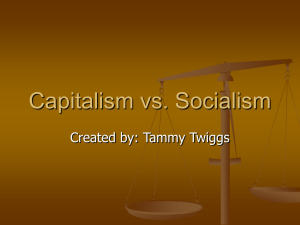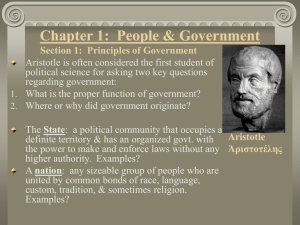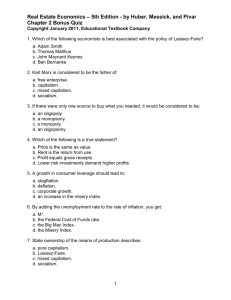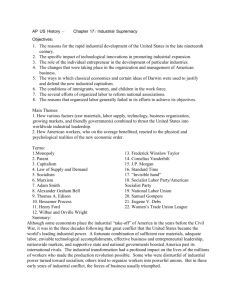Comparative Economic Systems: Capitalism, Socialism
advertisement
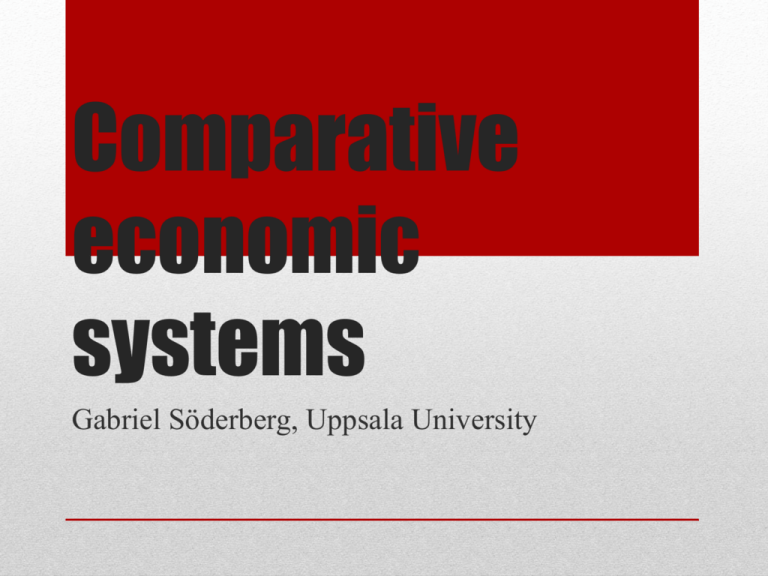
Comparative economic systems Gabriel Söderberg, Uppsala University Before we begin… • Historical process: Feudalism Capitalism Debate/struggle over alternatives alternatives shape each other • Theory vs. Reality, seldom any pure examples What do economic systems do? • Decide what is to be produced • Organize resources (human labor, energy sources, tools, machines building etc) for the production • Allocate the production results • Decide how to reinvestment surplus (if any!) • Provide legitimacy for the economic distribution Early economic systems • ”self-sufficiency”: Robinson Crusoe, families, tribes, the estate, monastaries • Gifts, feasting (potlatch) • Trade between regions, marketplaces extent debated • Loyalty/tradition: Feudalism Potlatch, North-West Pacific Coast 1914 Feudalism (simplified) Capitalism (in theory) • Private ownership of production resources (factories, machines, raw materials) owners = ”capitalists” • Workers receives wages, • Capitalists own production and sells it for money profit • Consumers decide the product (consumer sovereignty) • Capitalists decide how to reinvest profit accumulation • Legitimacy: system creates wealth, capitalists take on risk/are more creative than others Short definition? • ”Capitalism is a system of organizations, motivated by profit, producing goods with wage-paid employees, that is sold on markets by consumers that earn money either by profit or wage.” Capitalism ca. 1840 • After Industrial Revolution • Unprecedented production increase new rich class, ”capitalists/Bourgeoisie” • A new group: workers • Poverty, severe conditions in factories • Beginning of thoughts on how to change the system Socialism • Two origins: - From below: workers organizing in unions etc to improve living standards, wages, factory security etc - From above: intellectuals reacting against the clash between workers’ living conditions and new wealth created by system - A series of (often rival) socialist thinkers: Pierre-Joseph Proudhon, Robert Owen, Michail Bakunin Marxism • Systematized Socialism, provided a more intellectually coherent program • History progresses through a number of different economic systems: Feudalism, Capitalism, Socialism • Technological development social tensions (class struggle) new system • Capitalism revolutionizes technology impoverishment of the labor class revolution socialism allowed by the technology created by capitalism Socialist society??? • • • • Not much to go on from Marx! Planned economy (Soviet Union) Market socialism Mixed economy (most/all capitalist systems) War economy • World War I 1914-1918 • Government intervention in the economy on an unprecedented scale • Collaboration between government and business • Produce war material, maintain basic necessities at a decent price (rationing) • One over-riding goal: Win the war! • Huge postwar effect on belief in planning 1917-1991 Soviet planned economy • ”Temporary arrangement” on the way to Socialism technological development important • ”New Economic Policy”: 1917-1928, partial market economy • First 5-year plan ca 1930 • State owns all productive resources • Planners not consumers decide what to produce • Planners set prices and wages • After 1991 quick market reform (”shock therapy”) ”The Socialist Calculation Debate” • World Wars planned war economies socialism possible? • Ludwig von Mises 1921: Need of market to set prices for calculation • Friedrich von Hayek 1945: Market necessary to channel information to humans with limited understanding • Information is the crucial problem of socialism socialism is impossible! 1900-1960 Socialism changes capitalism • Labor unions higher wages better work conditions • Increased rights to vote governments introduce regulations, social security etc • Split between social democracy and communist parties • Depression of the 1930s bad reputation of capitalism • Mixed economies: large public sector, regulated markets, social security etc • Question: Was this the beginning of a new economic system? Market socialism • Markets not necessarily capitalist • Market mechanism better than planning • Oskar Lange: - Consumer sovereignty, central planning board experiments with prices, adjusts production after consumption - State owns factories, but managers act to minimize costs as if on market - Interest in computation and statistics as guidance 1960-1991 Eastern Europe • • • • • • After 1945: Extension of Soviet model to Eastern Europe 1960s: reform attempts to increase market mechanism Yugoslavia: work-managed production units Hungary, Poland: market reforms from 1968 Less reform in other countries: Albania, Romania etc After 1991 quick transition to market economies 1980- Neoliberalism • Attack against ”socialist capitalism” • Deregulations of markets • Business-friendly, anti-regulation politicians elected: Thatcher in UK, Reagan in USA • Fall of socialism ”There is No Alternative” • ”Heroic capitalism” • Market efficiency emphasized, reforms to ensure social efficiency 1979- China, Market reforms • Deng Xiaoping • Markets reforms: ”Economic Special Zones”, decollectivization of agriculture, introduction of privately-owned companies • ”Socialism with Chinese characteristics” • Communist party still in control, cf. Russia/Eastern Europé • Compare to NEP in Soviet Union? • Future? Where are we going? • Financial meltdown 2008 falsehood of market efficiency? • Technologies that dissolves private property (file-sharing, 3dprinters etc)? • Complete mechanization of production no workers needed who will buy products? • Environmental crisis in a system based on constant accumulation? • Economic system fit to make a massive infrastructural/technological/economic change?



